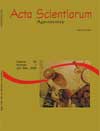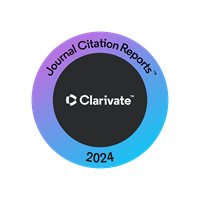Irrigation and physiology of mature coffee blooming in the Zona da Mata region (Viçosa) - state of Minas Gerais – Brazil
Abstract
Coffee culture is a very important activity for Brazilian economy, contributing significantly for the country budget. The irrigated coffee agriculture occupies a significant area in this scenario, which gives importance to any research whose results may increase quality and yield. This experiment was carried out at Laje farm, located in Viçosa, State of Minas Gerais, from September 1999 to May 2001, in a drip irrigated coffee field of 8 years, with 3.330 plants per hectare, as a part of the Coffee Development and Research National Program. Water deficit influence was also evaluated. Plant blooming was not affected by the water deficit, even for day-before leaf water potentials of -0.8, -1.2 and -1.9 MPa, after 30, 63 and 90 days without irrigation, respectively. At the local soil and climate conditions, plant blooming occurred due to temperature drop after rain, independently of the leaf water potential.Downloads
Download data is not yet available.
Published
2008-04-11
How to Cite
Soares, A. R., Mantovani, E. C., Rena, A. B., & Soares, A. A. (2008). Irrigation and physiology of mature coffee blooming in the Zona da Mata region (Viçosa) - state of Minas Gerais – Brazil. Acta Scientiarum. Agronomy, 27(1), 117-125. https://doi.org/10.4025/actasciagron.v27i1.2128
Issue
Section
Agricultural Engineering
DECLARATION OF ORIGINALITY AND COPYRIGHTS
I Declare that current article is original and has not been submitted for publication, in part or in whole, to any other national or international journal.
The copyrights belong exclusively to the authors. Published content is licensed under Creative Commons Attribution 4.0 (CC BY 4.0) guidelines, which allows sharing (copy and distribution of the material in any medium or format) and adaptation (remix, transform, and build upon the material) for any purpose, even commercially, under the terms of attribution.
2.0
2019CiteScore
60th percentile
Powered by 

2.0
2019CiteScore
60th percentile
Powered by 




















































